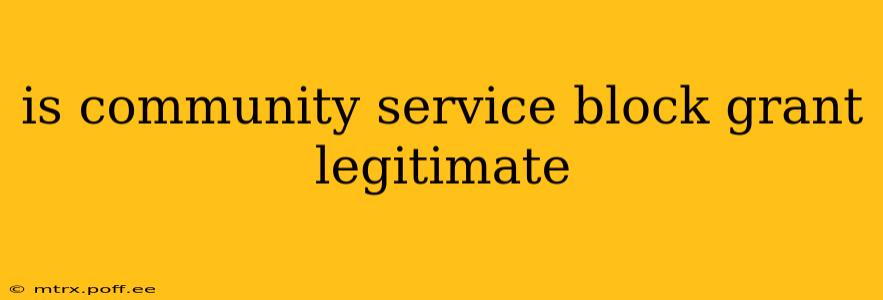The Community Service Block Grant (CSBG) program is a legitimate federal grant program administered by the U.S. Department of Health and Human Services (HHS). It's designed to help low-income individuals and families achieve self-sufficiency. However, understanding its legitimacy involves more than just confirming its existence; it requires recognizing how it operates, who administers it, and how to avoid potential scams.
How Does the Community Service Block Grant Work?
The CSBG program provides funding to local community action agencies (CAAs). These CAAs are non-profit organizations that develop and deliver a wide range of services aimed at alleviating poverty. These services are typically locally tailored to address specific needs within a community. The funding is not directly distributed to individuals; instead, it supports the infrastructure and programs of the CAAs. Therefore, if you encounter someone promising direct CSBG funds, be wary – it’s likely a scam.
Who Administers the Community Service Block Grant?
The U.S. Department of Health and Human Services' Administration for Children and Families (ACF) oversees the CSBG program at the federal level. However, the actual implementation and distribution of funds happen at the state and local levels through designated CAAs. This decentralized approach ensures that programs can be responsive to local community needs. It's crucial to find your local CAA to understand the services available in your area. You can usually find them through your state's government website or by searching online for "[your state] Community Action Agency."
What Services Are Funded by the Community Service Block Grant?
CSBG funding supports a wide array of programs designed to break the cycle of poverty. Some common examples include:
- Employment and training programs: These help individuals acquire job skills and find employment.
- Food assistance programs: These offer support for individuals and families facing food insecurity.
- Housing assistance programs: These aim to provide affordable housing options.
- Energy assistance programs: These help low-income families afford their heating and cooling costs.
- Child care assistance: This assists families with the costs of childcare.
- Financial literacy programs: These teach individuals how to manage their finances effectively.
- Health and nutrition services: These provide access to essential health services and nutrition education.
The specific services offered vary depending on the local CAA and the needs of the community.
How Can I Identify Potential CSBG Scams?
Unfortunately, the legitimacy of the CSBG program can be exploited by scammers. Be wary of anyone who:
- Promises direct CSBG funds to individuals: The program funds agencies, not individuals directly.
- Requests upfront fees or payments: Legitimate CSBG services are generally free or provided at a very low cost to those who qualify.
- Uses high-pressure tactics: Legitimate agencies will provide information and support without pressuring you.
- Asks for sensitive personal information: Be cautious about sharing your personal information, especially your banking details, unless you're certain you are interacting with a legitimate organization.
How to Verify the Legitimacy of a CSBG-Related Organization?
To ensure you're dealing with a legitimate organization, you can:
- Check the organization's website: A legitimate organization will have a professional website with contact information and details about its services.
- Contact your state's government: They can confirm whether an organization is officially affiliated with the CSBG program.
- Look for independent reviews or ratings: Check online reviews to see what other people have to say about the organization.
By understanding how the CSBG program functions and being aware of potential scams, you can confidently access the legitimate support it offers. Remember, if something seems too good to be true, it probably is. Always exercise caution and do your research before engaging with any organization claiming to be affiliated with the Community Service Block Grant.
